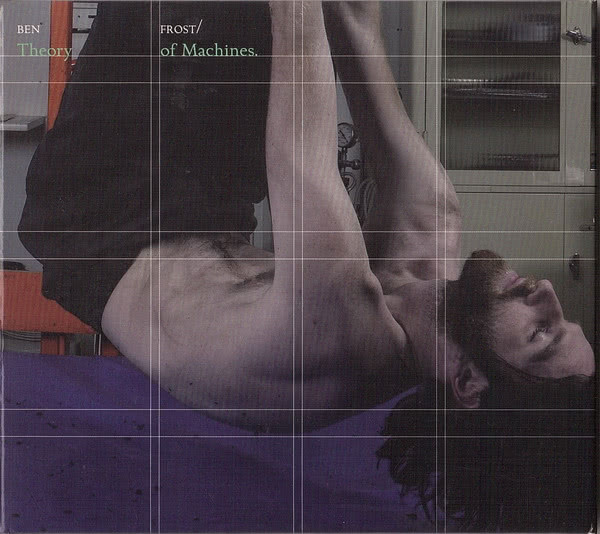Marcus Whale is one of Australia’s most prolific, versatile and ever-surprising talents, having performed in a variety of projects like BV, Collarbones, Scissor Lock and Tennis Boys alongside his solo guise. He’s also an important and incredibly timely voice in the artistic community, addressing the topic of modern queer identity with flawless creativity.
Having just released his beautiful, narrative-driven debut album Inland Sea (co-produced with Nigel Yang of HTRK and released through Good Manners Records) to all sorts of acclaim, we were more than eager to pick his brain about the albums that shaped his journey so far.
To track Marcus’ upcoming shows or order a copy of Inland Sea, stay locked to his Facebook page, as well as Good Manners.
Bjork – Vespertine

2001, One Little Indian Records
Since I was very young I’ve often thought about my music taste as a kind of journey with a permanent arrival – like this is the music I’ll like forever. I’ve thought it enough times now that I understand my taste will be constantly amorphous. However, Bjork has been with me without any kind of break since I was 13.
While Vespertine isn’t my favourite Bjork album, it’s the first one that captured my attention. There’s a story to this: I was in smelly Rotorua, NZ on a cricket tour (really) at the age of 14. Exhausted by time spent on the bus, I had a little siesta with my headphones in, listening to Vespertine.
I’d gotten the album for my mum the previous year and she didn’t take to it, but I’d listened to the first half of it a number of times enjoyably enough. I slept through the majority of the album, waking up only in the gorgeous orchestral swells of second last track ‘Harm of Will’, whose sheer beauty must have knocked me awake, my eyes struggling to open through the afternoon sun as it beamed through the window.
No listening experience has ever moved me as heavily as that one.
Scott Walker – The Drift

2006, 4AD
The Drift is the darkest album I’ve ever heard.
My friend Travis, who plays with me in Collarbones, sent me ‘Jesse’ one day on MSN Messenger around when the album was released in 2006, which crushed my previous ideas of the depths to which music could plunge.
While I never actually managed to listen to the whole album for years after, Scott’s Faustian croonings have continued to haunt me ever since, his wild, indulgent orchestrations couching his voice in some kind of Satanic pit.
All this said, I found a generous humanity in his storytelling that I don’t think compares to anything else. The way Scott deconstructs the idea of songwriting entirely, through-composing music entirely for the purpose of painting and enriching his words, was also a revolution to me.
Ben Frost – Theory of Machines

2006, Bedroom Community
I think of Theory of Machines as my number one influence when I started making more experimental and ambient music around the age of 16.
I felt like I spent a lot of time as Scissor Lock specifically trying to recreate the title track, its surging, crushing study of guitar distortion having a relentless power I’d never heard before. At its climax, it sounds like it’s at the point of breaking some kind of limit for a whole couple of minutes, as if the recorded media could barely contain its intensity.
The final track, ‘Forgetting You Is Like Breathing Water’ – a sumptuous 11-minute crossfade between electronic instruments and then acoustic instruments playing ever-rising long note figures – was more gorgeous to me than anything at the time.
Aaliyah – One In A Million

1996, Blackground Records
I had a bit of a journey arriving at my love of Aaliyah, having been a staunch rockist as a kid spending my teen years gradually overcoming my silly prejudices.
Madvillainy by Madvillain was the first hip hop album I liked; I’d been recommended to listen to it on a Tool forum which just goes to show the abject depths of those rockist biases. Madvillain somehow led me to Erykah Badu and J Dilla, but it was only Aaliyah that truly broke my gateway into fully blown pop R&B.
I used to listen to this every day when I was going to the Con. While I was studying up my harmony and aural skills, Timbaland and Missy Elliott’s production and songwriting on this changed the way I thought about music entirely, more so than any of the classical or contemporary classical music I was studying at the time.
And then there’s no shortage of inspiration I drew from Aaliyah’s voice herself, which felt like an angelic beam to me straight from heaven. Just like Drake, she taught me how to sing. I used to spend hours trying to nail every ad lib in ‘One In A Million’ and ‘Never Giving Up’. Apologies to my housemates of the time.
Gérard Grisey – Vortex Temporum

2001, Accord
Including this is a bit of a cheat, because it was actually a performance of it that changed my life, and there’s no definitive recording in my mind.
Vortex Temporum by French composer Gérard Grisey is a forty-minute work for six instruments of what’s called ‘spectralism’ – a compositional style that utilises the crossover between pitch (things like melody and harmony) and timbre (the ‘colour’ of the sound) by constructing harmonies around sound’s overtonal structure (sorry for the jargon).
But more importantly, it’s an extremely expressive, constantly-moving universe of sounds that arrested my attention while watching Sydney’s Ensemble Offspring present it when I was 16. Vortex’s drama and feeling of endlessness beguiled me, and directed me immediately to trying to uncover and replicate the compositional techniques that governed the power of its sound.
I don’t think I ever grasped its architectures, even after four years studying at the Con, but I certainly credit it with the inspirational energy at the heart of my continuing to explore the possibilities of acoustic instruments, as well as smashing the way I thought about music.
(To delve into this one a bit further, click through for some further reading on spectralism, timbre, and overtonal structure.)
Thou – Heathen

2014, Robotic Empire
This is the only album I’ve included that changed my life since I was a teenager. There’re a few that could fit in that category, but Thou’s Heathen I feel has had a more transformative effect than any.
Heathen is the album that got me back into metal, a gateway that’s gradually been edging open over the last few years. I spent a lot of time listening to this in Finland among pine forests, its slow doom riffs offering me a foundation as I explored that deeply foreign landscape.
Perhaps it’s because I’d cultivated a taste in slow forms of metal as a teen, but I find the whole thing completely sublime – its moments of light, its crushing lows. The second last track, ‘Immorality Dictates’, is teaching me, slowly, how to sing over this sort of music. So stay tuned.

































